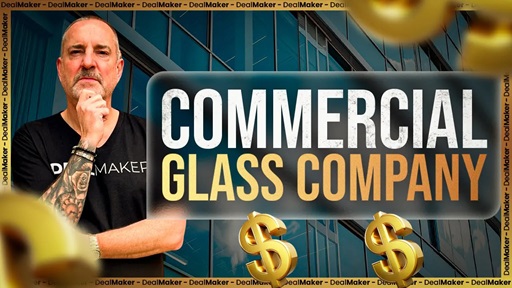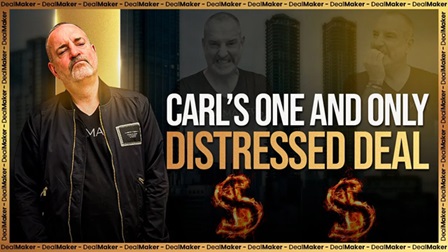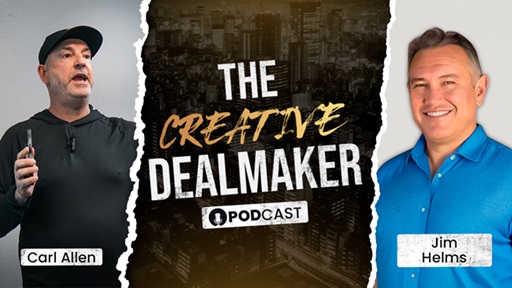Unlock Success: 5 Key Questions for Sellers (Business Acquisitions)
Unlock Success: 5 Key Questions for Sellers (Business Acquisitions)
In this video, Carl Allen covers the five critical questions to ask a seller in the first meeting, emphasizing the importance of establishing rapport first. The first question, “Why are you selling?” reveals the seller’s motivation, offering insights into their psychology and enabling tailored deal structures. The second question, “How do you get new customers?” helps identify businesses with organic growth potential, particularly those with repeat customers and referrals.
Next, asking “Who operates the business when you’re not in it?” evaluates whether the business functions independently of the owner, which is crucial for sustainability post-sale. The fourth question, “Why do customers choose you over competitors?” identifies the unique value of the business, potentially revealing its competitive edge. The final question, “What would you do with unlimited resources to grow?” serves as an emotional anchor, often highlighting unrealized growth opportunities while reminding the seller of their reasons for selling.
Carl underscores the power of this sequence to solidify seller motivation, establish rapport, and potentially save the deal if it becomes unstable later in negotiations.
Full Transcript:
Hey, guys. Carl Allen back with another short video for you today. In this video, we’re gonna be talking about what are the five really important questions that you need to ask a seller in that very first meeting. So let’s start off with the big one.
Number one, the first question that you need to ask a seller in the meeting, and bearing in mind, you don’t wanna be walking into that meeting and going straight into questions. You wanna be spending some time building rapport, building relationships, talking about anything from family to sport to vacations or whatever. Get the seller comfortable. The barriers will come down, and then these questions are gonna be a lot easier for them to answer.
But question number one is why. Why are you selling the business? Right? Really important question.
Because if we can understand why they’re selling, then we can understand what that motivation is. We can understand the seller psychology. Once we understand those things, we can build deal structures around that that hit the goals that they’re looking to get out of the acquisition. So why are they selling?
About twenty percent of business owners sell because they want the money. They wanna get out and they wanna move on to something else. Now we don’t typically buy those businesses because those people will just put the business on the market, or they’ll they’ll they’ll say, hey. Make me an offer that I can’t refuse, and I will sell.
And, typically, that’s gonna allow you paying at least five times a multiple of profit, to buy the business with the majority, if not all of that money at the closing table. We don’t wanna be doing those deals. We wanna be looking into the eighty percent that have some distressed seller psychology. So there’s a motivation, there’s a real reason why they want to sell the business.
And it could be sickness. It could be boredom. It could be death. It could be burnout.
It could be that they wanna retire. It could be that they’ve run out of ideas. It doesn’t matter what it is. We want to understand that question, why.
So always ask why you want to sell the business. And what you should do when they’ve kind of answered that question is use, use kind of mirroring. Right? So mirroring is where you repeat the last three words of the sentence.
So if if you ask a seller, so, hey, yeah, just out of interest, like, you know, why are you selling the business? Well, you know what? Can I really want to retire?
Your response would be, you really wanna retire? Yeah. Well, because, you know, I’m working in here fifty hours a week, and my my my wife’s getting really annoyed with me, and, I’m not spending any time with with my grandchildren.
Time with your grandchildren?
Yeah. Well, because, you know, my grandchildren now, they’re they’re they’re getting, like, to the age where they wanna spend more time with me, and I just don’t have enough time. And and it’s really kind of frustrating me. It’s really making me depressed.
Really making me depressed? You see where I’m going. Right? You can really kind of delve in to the detail by the mirroring technique, which I looked from Chris Voss, which is just repeating the last one to three words of the sentence.
And then what you’re doing is you’re gathering a lot more information on that sale. And the more information that we know about them, the easier it’s gonna be for us to negotiate price and terms when we get to that stage in the transaction process. So that’s question number one.
Question number two should always be and we ask these questions in this order. Question number two is what’s your strategy to get new customers?
So don’t ask the generic question. What’s your marketing strategy? What’s your business development strategy? How do you grow the business?
Get specific. Right? Get specific. How do you get new customers? How do you win new customers into your business?
Talk to me about that. And what’s really fascinating, and you will find this out when you go and you start having your own seller conversations, is that most business owners, most small business owners, want to five million dollar revenue businesses in the traditional industries like home services or construction or something like that, they don’t do any marketing.
They say, well, we don’t we don’t really do marketing. We we don’t really need new customers because all of our existing customers, they’re repeat buyers. That’s a good sign. Everybody loves recurring revenue.
Right? And our customers are so happy with us, they give us a lot of referrals. Again, great thing. If you’ve got if you’re looking at a business that does no marketing but has got phenomenal repeat business and a lot of referrals coming in from that customer base, it tells you that it’s a really great business.
Now imagine you buy it and you plug in a marketing machine. You plug in a way to generate more leads. You plug in a sales conversion process, either through a sales team or an outsourced agency or something along those lines. If you’re doing full customer life cycle management, you plug in a CRM, a customer relationship management system, you you get where I’m going.
Right? So you always wanna find businesses ideally that do little to no marketing because that tells you that that’s a big opportunity. So I’m always asking that as question number two. Question number three, also really important.
I’m gonna ask the question, who operates your business when you’re not in it? Right? So who’s the operator?
Now, in an ideal world, you don’t wanna buy a business where the owner is the operator. Right? And the owner’s doing a lot of the work. They might be doing a lot of the selling.
They might own a lot of the customer relationships. They might have all the systems and processes and KPIs, in their head, and it’s like a one person dictatorship. Right? You don’t typically wanna buy one of those businesses, because the problem is, if the seller exits, all of that goodwill that’s trapped in their head is gonna leave alongside of it.
The best businesses to buy are where the owner is the investor, and they have a team, they have a general manager, they have other people in the business that can run that business when they’re not there, and it’s got systems and processes and KPIs that you can check as part of your vetting and due diligence. So you wanna buy a business really that’s like a machine. Right? It works irrespective of who’s actually running it.
That’s the perfect business for you to buy. And sometimes when I ask that question, it’ll say, well, hey. Imagine, mister business owner or missus business owner, you get shipwrecked on a desert island. Right?
And and nobody can find you for a month. Right? So you’re out of the business for a month. No.
There’s there’s there’s nobody. You’re not in the business. When you come back in four weeks, like, like Tom Hanks in Castaway with the big beard and all the hair kinda going on and lost some weight, didn’t even that movie. So so you go back looking leaner and fitter and and with all this hair.
And what would happen to your business? Would it still be alive? Would it still be around?
Now in my businesses, if I wasn’t in the business for four weeks, it would actually grow.
Why would it grow? Because my team knows exactly what they’re doing. Right? We painted the strategy.
We check-in on that every ninety days. I leave them. I get out of the way. I leave them to go off and and do what I need them to in that business.
I don’t need to be checking up on them all the time. Yes. I have KPIs that I look at each and every week, and I might have a call once every two weeks with with my GM just to kinda check-in. But if I wasn’t in any of my businesses, they would all thrive without me being there.
Right? And you might think, well, Carl, doesn’t that make you feel sad? No. It makes me feel happy.
It’s a compliment. Because my businesses are engineered, the machines, they work without me being inside of them. Right? So really, really important that the seller might say, well, oh my god.
It wouldn’t last two days. Like, I I do everything. Right? And my team, they’re useless.
Right? They they they can’t, you know, they they they can’t do anything. Right? I have to do everything.
So that’s not a business that you can buy, unfortunately. And the business owner really, in that scenario, kinda doesn’t really have a job. So it does have a business. They have a job, and it’s a job in their own business.
So you don’t wanna buy a job. Right? You wanna buy a company, a business that thrives and can work without the owner or the shareholders being involved in the day to day. Really, really important.
So question number four that I ask is I’m I’m getting into kind of the differentiation of the business and the competitive market. And and I don’t say, hey. Tell me who your top five competitors are. Right?
You can ask that question. I ask a better question. I say, why do people buy from you and not the competitors? I don’t talk about competition.
I’m not interested. I know who the competitors are because I’ve done the research. But ask the question, why do people buy from your company and not the competition? Right?
Nine times out of ten, they can’t answer it. They’ll say, well, I don’t know. They just do. Right?
How do you find out? Call your top five customers or your top ten customers and ask them, why do you buy from me, Not the competition. You know, I love the fact that you’re a customer, but tell me, you know, why why do you buy from me and what else can I do to serve you and and if you make that relationship better? You ask your top customers why they buy from you.
They’re all gonna probably say something very similar. That’s your USP, your unique selling proposition. Right? Really, really important that you figure that out.
And then number five, last but not least, and this is a really important question that I ask. Question five is actually the most important question.
So what I do is I future pace.
And what I actually say to them is this. I say, hey.
Suspend reality for a moment. Right? Suspend reality for a moment. Imagine you were not selling this business.
What would you do if you had unlimited resources, unlimited time, unlimited cash, unlimited people. If you couldn’t fail, if it was guaranteed, what would you do in the next three to five years to grow this business? What would you do with it? Right?
Now it’s I asked that question for two really important reasons. Right? Number one, I wanna understand where all the low hanging fruit is. Right?
Whilst I’ll probably know a lot about the business before I go in and see the seller, they’re gonna know a hundred or if not a thousand times more than me because they’ve been in it every day for the last ten, twenty, thirty, sometimes even forty years. So I’m trying to capture those wins, those quick wins that I know if I go in, they’ve already painted that picture. They’ve already designed that strategy for me. I just gotta go in and tweak it and implement it.
Right? But there’s a second reason I asked that question, and it’s psychological.
Right? So when you ask that question, suspend reality for a minute. If you had all the resources you’re ever gonna need and you couldn’t fail, what would you do to grow the business in the next three to five years? And then watch their body language when they answer this question.
Right? So you have to do this over Zoom or you have to do this in an in person meeting. This doesn’t work on a on a phone call. Right?
You’ve gotta be able to see them, their facial expressions, and their body language. Let me tell you what happens. Right? So the first thing that happens, right, when you ask that question is they go on a journey.
They’ll sit back and they’ll start smiling. They’ll say, well, wow. That’s a really good question. No one’s ever asked me that before.
But but but let me tell you what I would do. I’d go into this territory, or I’d launch this new product, or I’d maybe acquire this company down the street and bolt it into what I’m gonna do. And I do this, and I do that, and I I’d go raise some capital, and and, I’d hire all these new people, and I’d maybe build a new sales team, and I’d I’d I’d get more deeper into marketing through social media. And I I’d do all these amazing things.
I’d I’d maybe create a new supply chain and and all this stuff. I buy new equipment. Right? They go through all this, and they start to get really excited.
And what you’ll notice from the initial question, they’ll kind of sit back because they’re thinking. And then they’ll sit up, and they’ll engage with you, and they’ll get a lot more excited, and they’ll start talking faster. But then what happens about two thirds the way through that conversation, they realize something in their brain. Something flicks in their head that convinces them that they were right to actually decide to sell the business.
Right? And you’ll see it. You’ll see it. They’ll go from, like, being animated and talking quickly, and then all of a sudden, about two thirds the way through their explanation, they’ll sit back, will typically fold their arms, and they look down.
And their their words get quieter, slower, and don’t be surprised to see a bit more of a sad expression on the face. Right? And what what’s happened in that period in their brain is is they’ve realized why they actually want to sell the business and that they haven’t got what it takes to do all that. They haven’t got the passion anymore.
They haven’t got the energy anymore. They don’t wanna take any more financial risks anymore. They’re done. They’re done with the business.
And what that does is really, really powerful. That locks in that why. It locks in that determination that it’s time for them to sell the business. So what you’re doing in question five is you’re reinforcing question one.
Right? So remember, we said ask these in order. Right? So what you do is you go from one, two, to three, to four, and then to five reinforces question one.
So it’s like the topping and tailing of the whole conversation is why you sell them. Right? And then why that’s also really important is you might get nine tenths the way down the negotiation. You might be a week away from closing or even the day before.
And it’s often not oftentimes, but sometimes sellers get cold feet. Right? They might wake up one day and think, you know what? I’ve owned this business for twenty five years.
I’m selling it to somebody tomorrow.
I don’t know, man. I I I don’t know what I’m gonna do for the rest of my life. Like, what am I gonna do? I don’t have any hobbies.
I’m in my business all the time. You know, what am I what am I gonna do? Right? It’s it’s crazy.
And sometimes, sellers will will will pause or or they might withdraw from the process and say, you know what? I thought I was ready. I’m not. Because you’ve asked that question and you’ve created like, that question, when you ask it, the seller will never ever ever forget that question ever.
That will burn in their mind for the rest of their life. Right? Because you’re creating such a deep emotional feeling inside of them when she’s answering the question. It’s like heat stamped into their brain, into their subconscious mind.
So what happens is if a deal ever falls over or a seller, the negotiations get a little bit testy, lawyers are falling out, or or whatever it is, you go back to the seller. Right? And you just say, hey. Remember when I first met you?
Or remember that meeting where we had where I asked you that question?
What would you do if you weren’t selling? To spend reality, what would you do in the next three to five years to grow the business, unlimited time, energy, resources? Remember when I asked you that? And the seller will say, yeah.
We’ll never forget it. Right? The way you’ve asked the question, you ask it the way I taught you, we’ll never forget it. So, well, hey.
You know, remember that. You told me in that meeting that that you were done, right, you wanted to sell. Right? And now you’re saying that you’re not.
Right? Remember that. Let me ask you the question again. You can go back to that.
And that’s called an anchor. Right? It’s called an anchor. You anchor that question in their brain every time the deal gets sticky or for whatever reason, you need to pull a rabbit out of the hat.
That’s your rabbit. Right? Just go back to that question. Ask it again. Right? And you don’t need to do it in person this time.
Call the guy up. Call the lady up. Say, hey. Remember that meeting when I asked you what you would do to scale?
And you got really excited, and you gave me a great game plan, and thank you for that. We’re gonna be implementing most of that. But then you realize I could see it in your tone and your body language that, you know, you were done. You’re ready to sell. You still feel like that. And what you’re doing is that emotional state that they went through in their brain when you ask the question, you plug straight back into it straight back into it. It’s instantaneous.
Happens in a nanosecond. Right? So that’s your saving grace. That’s your ace of hearts or whatever. That’s your trump card to always keep this deal on the tracks.
So five seller questions. Why are you selling? How do you get new customers? Who’s the operator of the business?
How are you differentiated in the market? Why the customers buy from you versus competition?
And then future pace. What would you do to spend reality three to five years, all the resources you need to scale that business? And watch them. Watch their facial expressions, listen to the tone of their voice, and watch their body language as they answer it.
Right? Number one, it’s gonna give you a game plan for what to do as the business owner. But most importantly, it closes the loop on that first meeting, and you can always go back to that bad boy when the seller falls off the track or decides that they don’t wanna do the deal. Works ninety nine times out of a hundred.
Right? Really, really important. So guys, I hope you enjoyed that, and please hit like and subscribe so you can get access to all my other content as I publish it in real time. And if there’s a question that you have that I’ve not yet answered in one of these videos, hit me up in the chat.
My team will come back to me, and I will do that personal video just for you. So have a great rest of your day, and I will see you soon. Until then, bye for now.
Return to playhead




